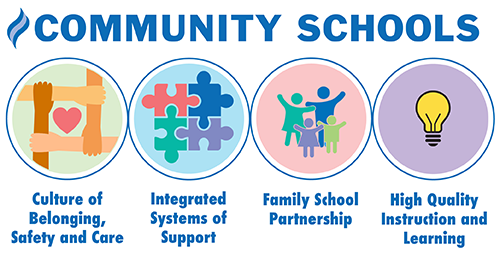Community Schools
Jump to: Overview | Programs and Services | Contact | FAQs
Overview
Community schools serve as hubs that promote positive, equitable outcomes by connecting students, families, and school communities with local supports and resources to help them thrive. Community schools address the whole child and leverage partnerships that promote student achievement, positive learning conditions and student well-being through additional services like academic and language supports, nutrition supports, as well as behavioral and general health care that go beyond traditional classroom education.
HCPSS’ Community School Vision is that students are engaged, connected, and life ready.
Our Community Schools implement four key practices based in the core values of voice, equity, empowerment, and transformation:
- High Quality Instruction and Learning
- Culture of Belonging, Safety and Care
- Family School Partnership
- Integrated Systems of Support

HCPSS’ community schools will be funded through the Blueprint for Maryland’s Future, a law mandating the use of programs and innovative approaches to eradicate achievement gaps and ensure opportunity for every student.
- Cradlerock Elementary
- Deep Run Elementary
- Ducketts Lane Elementary
- Guilford Elementary
- Homewood Center
- Lake Elkhorn Middle
- Laurel Woods Elementary
- Stevens Forest Elementary
Programs and Services
Because students’ and families’ needs vary by community, the services provided at individual community schools vary as well. Depending on the needs of a given community, community schools can provide services such as:
- Extended learning time
- Extended school year
- Safe transportation to and from school
- Vision and dental services
- Expanded school-based health center services
Contact
For more information about HCPSS’ community schools, please contact communityschools@hcpss.org.